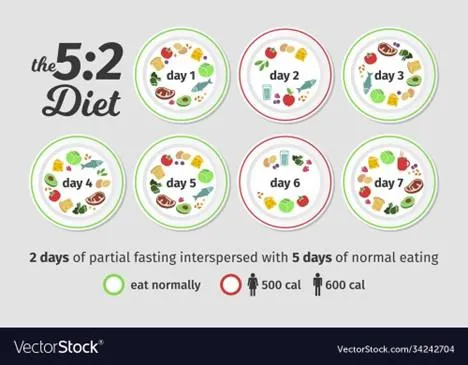
How to do the 5:2 Diet for Intermittent Fasting
How to do the 5:2 Diet for Intermittent Fasting
A couple weeks ago, we discussed the Eat-Stop-Eat method of intermittent fasting. We continue our series this week with the 5:2 Diet. With the 5:2 diet, you eat normally for five days of each week and restrict your calories intake to 500-600 calories on the other two days. The two reduced calorie days should not be back-to-back, but rather non-consecutive. It is important to have at least one non-fasting day in between your fasting days.

It’s important to not consume extra calories on your non-fasting days.
You are the expert on your own body. So, plan in advance how you will consume your 500 to 600 calories on fasting days. If you are someone who functions better with breakfast, then have a small breakfast. If you don’t normally eat till afternoon, then plan a lupper meal that is healthy and low-calorie.
Most people who use the 5:2 diet follow one of these two patterns for their fasting days. The first routine is to eat three small meals a day, which are like your normal breakfast, lunch, and supper meals, but consuming reduced calories for each of the three meals and ensuring that you are consuming nutrient rich foods. The second option is to eat two slightly bigger meals during your fasting days. This would be the equivalent to lunch and supper. Once again, keep in mind how you will use nutrient rich foods to make up your 500 to 600 calorie fasting day meals.

With the 5:2 diet, there are gender differences for this diet. If you are a woman, you may only consume 500 calories on your fasting days and men may consume 600 calories on their fasting days. It is crucial to plan and use your calorie budget strategically to ensure that you aren’t hungry before your fasting day is over.
The best foods to consume are nutritious, high fiber, high protein foods that will make you feel full on fewer calories.

Foods that can help to satisfy your hunger on fasting days are soup, a generous portion of vegetables, natural yogurt with berries, boiled, poached, or baked eggs, cauliflower rice, grilled fish or lean protein, low calorie cup soups, black coffee, tea, and still or sparkling water. We recommend you experiment and find what foods work best for you that fit within the 500 to 600 calories count on fasting days.
You can use Google to help you find low calorie recipes and food suggestions for your fasting days. For example, here is s website that offers 27 meal plans for 500-calorie fast days. 5:2 diet meal plans: What to eat for 500 calorie fast days | GoodtoKnow

When you first start fasting, it is not uncommon to feel overwhelming hunger at times. You may feel like you are moving slower or feeling weaker the first couple of times you fast. The feeling of hunger will fade if you stay busy doing errands, housework, or performing work related tasks. In other words, activity distracts you from feeling hungry. For the majority of people, fasting becomes easier after the first couple days that they are fasting.
If you don’t normally fast, it is suggested that you keep a low-calorie, healthy snack handy to consume if you start to feel faint or sick. If this feeling of faintness and sickness are persistent on your fasting days, eat something and discuss this with your family doctor. Don’t be hard on yourself, if you are one of the people whose body is unable to tolerate fasting. Not everyone can fast, especially if you are diabetic. But it is recommended that you check with your family doctor before you begin intermittent fasting of any kind as they are aware of your other health issues and are the best people to help you make the decision whether intermittent fasting is okay for your body.

The 5:2 diet is not recommended for people with eating disorders, who experience blood sugar level drops, pregnant people, nursing people, teenagers, children or people with type 1 diabetes, or people who are malnourished, underweight or have nutrient deficiencies.
While intermittent fasting can be beneficial for some, men appear to benefit more than women. Some women have reported their period stopping when they are on an intermittent fasting diet. If that is the case for you, then you should stop the diet immediately and report it to your family doctor. The majority of women’s period returned when they went back to their regular diet.
If you have any questions about the 5:2 diet you can email me at info@kairoscoachingbylakeitha.com .
For SEO Purposes Only:
#5:2diet #intermittentfasting #health #wellness #weightloss #kairoscoachingbylakeitha


